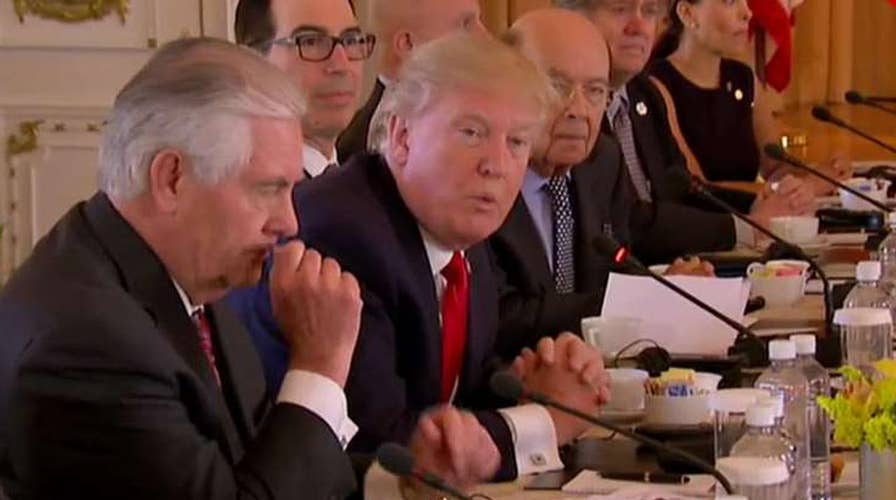Trump: Made tremendous progress in relationship with China
President Trump and Chinese President Xi hold bilateral talks
The historic first meeting between President Trump and Chinese President Xi Jinping is underway at Mar-a-Lago. While the news media will focus on U.S. – China issues such as North Korea and the South China Sea, most Americans have a singular concern—China’s unfair trade practices and how China’s cheating threats their job security. When President Trump sits down with the Chinese President, one would hope that he keeps the plight of the American worker close at mind.
The U.S. aluminum industry, one of America’s most iconic industries, has been decimated by China’s cheating.
Over the last 18 months, more than 3,500 American aluminum workers have lost their jobs due to China’s illegal aluminum subsidies.
In January 2017, the outgoing Administration finally challenged China’s illegal aluminum subsides at the World Trade Organization (WTO). This is a historic case that for the first time goes right at the heart of how China uses government directed capital to unfairly capture market share at the expense of U.S. workers and their families.
According to the consultation request, for years the Chinese government has provided below market loans to aluminum producers, forgiven producers’ debt, and provided highly subsidized energy and other inputs to these companies.
These subsidies allowed the Chinese aluminum industry to grow much larger than it otherwise would have if it had to compete fairly and causing a massive excess capacity crisis that is weighing on global aluminum prices.
American producers and workers can compete with anyone, but not when foreign governments cheat and rig the system.
You don’t have to look far for examples of China’s illegal subsidization of its aluminum industry and other key sectors of its economy.
Chalco, a Chinese state-owned entity and one of the country’s largest aluminum producers, has over $20 billion in debt and its debt-to-equity ratio is well beyond acceptable industry standards. Like other aluminum producers in China, Chalco used government directed low-interest debt to fuel its massive capacity expansion. From 2008 to 2014, Chalco’s total debt increased by over 131 percent and its total assets increased by nearly 50 percent, yet over this same period Chalco recorded massive losses.
In 2014, Chalco recorded the largest loss of any Chinese state owned entity. This defies basic logic and economics. In a free market, companies like Chalco would not continue to receive funding at below market rates. However, Chinese state owned banks are recklessly propping up domestic China’s aluminum producers like Chalco.
Other Chinese aluminum producers like China Hongqiao, the world’s largest aluminum producer, use government directed input subsidies to mask the fact that without these subsidies it would not be able to meet its cost of capital.
Currently, China Hongqiao is under investigation for irregular audit findings and its shares have halted trading on the Hong Kong stock exchange. On Feb. 28, Emerson Analytics released a report saying that Hongqiao has hidden 21.6 billion yuan ($3.14 billion) in costs through underreporting and subsidization, thereby distorting its true profitability. "Our investigations and analysis have shown that, mainly through underreported costs and subsidies provided by connected parties disguised as independent third parties, China Hongqiao has fabricated the profitability that vastly exceeds those of its peers," it said.
The case of Chalco and China’s Hongqiao are emblematic of the Chinese economic model that is built upon massive amounts of highly subsidized directed credit to build and expand what would otherwise be uneconomic production and capacity at the expense of U.S. producers and thousands of ordinary hard working Americans. American workers are paying the price for China’s industrial debt problem.
Ironically, in the early 2000s when China joined the WTO, aluminum experts expected China to be a net importer. But, China has abused the rules. Fast forward to 2016, China produced more than half of the world’s aluminum without any natural comparative advantage other than unprecedented government support, causing a massive amount of excess production capacity to overhang the aluminum market. This has depressed prices by more than 45 percent, making it incredibly challenging for competitors to keep up.
The consequences in the U.S. are far and wide. A recent Economic Policy Institute report notes that the United States bears a uniquely large burden, suffering more than other countries from subsidized and dumped imports in these industries.
In 2001, when China joined the WTO, there were 18 aluminum smelters in the United States. Today, there are only five. The loss extends beyond the smelters to American workers, their families, and their communities.
President Xi’s visit is a chance for President Trump to call out China’s cheating, put American workers first and demonstrate his commitment to hold China accountable to the obligations it agreed to abide by when it joined the WTO and continue the WTO case against China’s illegal aluminum subsidies. American producers and their workers need real concrete action.
As part of his bold vision to Make America Great Again, President Trump needs to make it clear to China that its illegal trade practices will no longer be tolerated and keep the plight of Americans close at mind when he sits down with the Chinese leader.





















